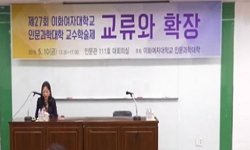Isang Yun, a Korean-born German composer, could not return to the homeland for political reasons during his lifetime. In 2017, the 100th anniversary of his birth, however, a lot of memorial events were held in Korea and his music began to resonate. Th...
http://chineseinput.net/에서 pinyin(병음)방식으로 중국어를 변환할 수 있습니다.
변환된 중국어를 복사하여 사용하시면 됩니다.
- 中文 을 입력하시려면 zhongwen을 입력하시고 space를누르시면됩니다.
- 北京 을 입력하시려면 beijing을 입력하시고 space를 누르시면 됩니다.

미완의 귀향, 윤이상 음악의 한국 수용 = Unfinished Return: Reception of Isang Yun and His Music in Korean Society
한글로보기https://www.riss.kr/link?id=A105281992
- 저자
- 발행기관
- 학술지명
- 권호사항
-
발행연도
2018
-
작성언어
Korean
-
주제어
윤이상 ; 한국 현대음악 ; 음악과 정치 ; 귀향 ; 음악 수용 ; Isang Yun ; Korean Contemporary Music ; Music and Politics ; Returning Home ; Music Reception
-
등재정보
KCI등재
-
자료형태
학술저널
- 발행기관 URL
-
수록면
61-90(30쪽)
- DOI식별코드
- 제공처
- 소장기관
-
0
상세조회 -
0
다운로드
부가정보
다국어 초록 (Multilingual Abstract)
Isang Yun, a Korean-born German composer, could not return to the homeland for political reasons during his lifetime. In 2017, the 100th anniversary of his birth, however, a lot of memorial events were held in Korea and his music began to resonate. The existence of Isang Yun has been trapped so far in the frame of the political ideology of pro-North Korean artist or a unification activist; his music was not able to escape the preconceived notion of hard-tolisten modern music.
This paper is an attempt to examine the current status and meaning of Isang Yun and his music in Korean society. After reviewing how Yun's music has been received in his home country since the 1950s, I focus on two problems that have been obstacles to the acceptance of his music: the political activities of the composer and the cultural circumstances in which his music sounded unfamiliar to Korean audiences.
동일학술지(권/호) 다른 논문
-
- 세계음악학회
- 박미경 ( Mikyung Park )
- 2018
- KCI등재
-
베토벤 9번 교향곡의 일본화: 일본의 연말 다이쿠(第九) 현상의 비판적 연구
- 세계음악학회
- 이경분 ( Kyungboon Lee )
- 2018
- KCI등재
-
딤프 뮤지컬 아카데미 창작자 과정의 참여관찰 보고: 소재발굴에서 리딩공연까지
- 세계음악학회
- 서정미 ( Seo Jungmi )
- 2018
- KCI등재
-
베트남 한류문화 연구의 전개와 현황: 한국과 현지 학자의 한류연구주제와 접근법 비교를 중심으로
- 세계음악학회
- 장윤희 ( Yoonhee Chang )
- 2018
- KCI등재





 KCI
KCI KISS
KISS



